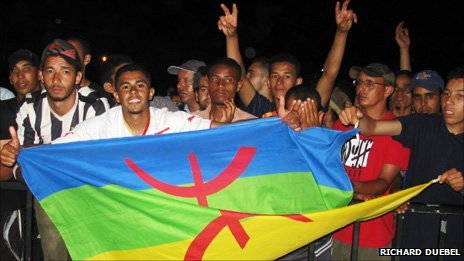Since 2011, the Arab Spring revolts have become the source code for “people power movements” across the planet. Little, however, has been said about the indigenous Berber minority risings coursing through the Maghreb; but no more. Oppressed by Arab regimes for decades, Berber (Amazigh) militias have surged to the center of the post-Ghaddfi governance battle in Libya. In Tunisia and even in Egypt, Berber organizations have mounted spirited campaigns to secure recognition of their culture and Tamizight language. Nor have the Amazigh in Morocco and Algeria been pacified by long overdue reforms and concessions hastily granted by their governments in 2011. Continue reading
Category Archives: Libya
Boss Status: How Gaddafi Became the “King of Kings” In Africa
by Webster Brooks
Despite the Obama administration’s best efforts, the first black President is having a hard time getting the Africans, better yet the African Union (AU), on board with military actions in Libya. Why? Because Col. Muammar Gaddafi has been the most dominant force in Africa for over thirty years.
We keep hearing about how the Arab League is feeling and where everyone else stands on Libya. But, we hear little about what the African countries think, an important detail since it’s their continent and all. Right now, the coalition of mostly sub-Saharan African states (and some of your most notorious “dictators”) has refused to support the United Nations and Arab League’s “No Fly Zone” resolutions in Libya. So now, bombs dropped on Libya each day looks more and more like a European and Arab thing. Recently, Ramtane Lamamra, the AU Commissioner for Peace and Security said events in Libya require “urgent African action” to bring about an end to the hostilities. How did they propose doing that? Continue reading
Will Arab Spring Revolts Spread to Sub-Saharan Africa
by Webster BrooksToday, Sub-Saharan Africa has two military regimes (Madagascar and Niger) and only one monarchy (Swaziland). Thus, the likelihood of a democratic tsunami sweeping over Sub-Saharan Africa is remote. Based on the political mix of Sub-Saharan nations, both the scope and pace of future democratic upsurges will be varied and more deliberate.
Understandably, Sub-Saharan opposition forces are impatient with the status quo and frankly envious of the “Arab Spring” revolts that toppled Egypt’s and Tunisia’s dictators in the space of a few short weeks. But their impatience should be tempered with the understanding that in Egypt and Tunisia, the forces of democracy have yet to win democratic rights and the free elections they demanded; they are negotiating for them. The dictators are gone but the old systems are still intact. The work of re-ordering society on a new democratic foundation will prove far more difficult than dislodging authoritarian rule. It is only in Libya that revolutionary forces are attempting to overturn the old order and seize state power by the force of arms. Continue reading
In the Shade of Libya’s Revolution
February 24, 2011
Moammar Ghadafi’s days as Libya’s maximum dictator days are numbered. With or without America and the European Union’s assistance, the forces of the “February 17 Revolution” will ultimately prevail in Libya. The tide of the civil war has irreversibly shifted to anti-government forces that control Libya’s eastern provinces, and most major cities in the west. On Friday, the fall of Zawiya to opposition forces after a bloody see-saw battle brought the revolution to within 28 miles of the capital. In Tripoli, Ghadafi remains holed up in a fortified compound while loyalist militiamen and mercenaries roam the streets firing on civilians in a desperate attempt to maintain control of his last stronghold. That Moammar Ghadhafi’s criminal rule will end soon is no longer the issue; the question is how much more death and destruction Ghadafi will visit on Libya before he ultimately deposed. For President Obama, America’s role in shaping the “end game” of the February 17 Revolution and Libya’s post-Ghadafi order will have immediate and far reaching implications across the Middle East—a region already rent with political turmoil from Bahrain to Morocco. Thus a valid question arises: How will President Obama respond to the crisis and what vital American strategic interests are at stake in Libya? Continue reading


